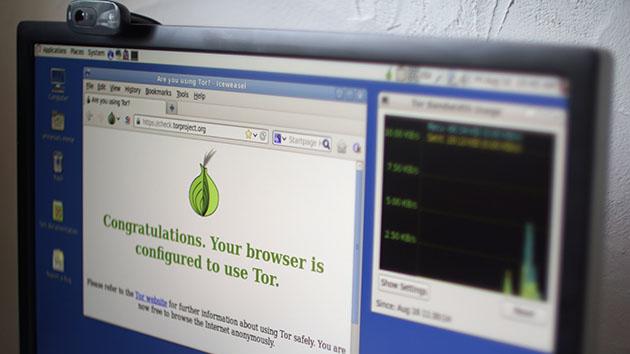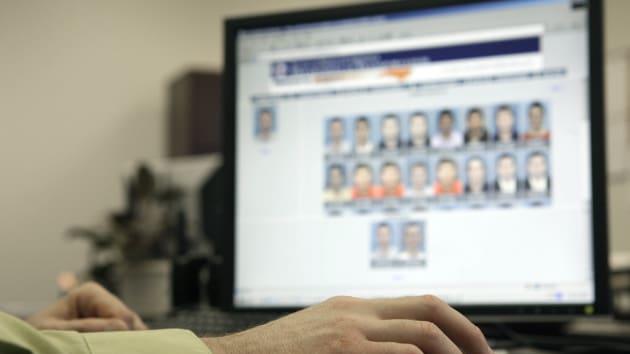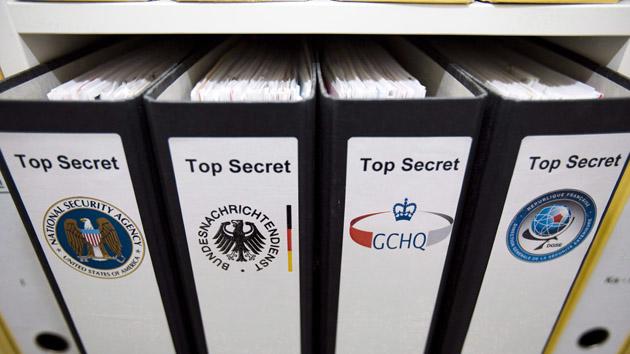EdwardSnowden
Latest

Here are the security measures NSA spies hate the most
It's tempting to imagine that few online safeguards will stop NSA surveillance in its tracks, but that's not true. A new leak from Edward Snowden's files reveals that there's a surprising number of ways to thwart these snoops, at least as of 2012. While you may already know that the NSA sees Tor's anonymity network as a problem, it hates the heavy encryption on chat protocols like CSpace or Off-the-Record, internet calling systems like ZRTP or highly secure email systems like Zoho. Use two or more of these services in tandem and you may as well disappear completely -- the NSA considers the combination a "near-total loss."

Joseph Gordon-Levitt will play Edward Snowden in forthcoming NSA movie
When you're making a movie based on one of the biggest stories in recent years, and centered around one pretty normal-looking data administrator, really got to get the casting right. Maybe Oliver Stone's pulled it off. Joseph Gordon-Levitt, who you might remember from well, all these movies, will be playing Edward Snowden in the director's forthcoming movie. In case you forgot why, Snowden leaked a whole lot of classified documents in 2013, which lead to widespread criticism over the NSA's data-gathering methods - from world leaders and Joe Internet alike. The screenplay is based on two books: The Snowden Files by Luke Harding and Time of the Octopus by Anatoly Kucherena, which points to a substantial amount of screen time for whoever plays the whistleblower. The movie goes into production in January next year. [Image credit: John Sciulli/Getty Images, AFP/Getty Images]

Edward Snowden documentary reveals more about the new leak source (update: New Yorker interview)
The US government insisted that there was a second source leaking intelligence data besides Edward Snowden, and we now have some extra evidence to support this claim. Laura Poitras' just-launched documentary covering the Snowden leaks, Citizenfour, reveals that this mysterious tipster is both higher in the intelligence ranks and, at least at the time the movie was shot, still serving. In other words, the leaker theoretically has access to up-to-the-minute info about the US' surveillance activities. When Snowden sees this information (provided by reporter Glenn Greenwald) in the documentary, he's visibly startled -- even he wasn't aware of another insider.

The NSA's search tool is a Google for the world's communications data
If sharing really is caring, then the NSA must care a lot. That's the thrust of a new report from The Intercept that pulled back the curtain on a search system called ICREACH -- launched in 2007, the system allows members of more 20 different US agencies to quickly sift through the communications metadata of both foreigners and citizens on US soil. And the reason for all this? Well, the stated goal was to allow members of these government agencies to identify persons of interest and help agents monitor the activities of "intelligence targets" at home and abroad. Putting aside its ability to crawl through some 850 billion metadata records (and growing), one of ICREACH's greatest assets might be its straightforward interface. It's referred to in internal documentation as being "Google-like" and allows researchers to dig into metadata records by punching in simple "selectors" like email addresses and phone numbers.

US military bans staff from reading a site devoted to leaks
Glenn Greenwald and Laura Poitras launched their own news site, The Intercept, to post high-profile leaks without worrying about the hassles that can come with publishing through major media outlets. They don't have to worry that an outside editor will put the kibosh on an Edward Snowden story due to government pressure, for instance. However, that isn't precluding officials from doing what they can to limit access. The US military has issued directives that ban staff from reading The Intercept due to the classified material that frequently pops up, particularly from a new reported leak source. Workers caught browsing the content might face "long term security issues," one such memo warns. And that's if they can read it at all; people in multiple military branches say the site is blocked altogether.

Recommended Reading: Healthcare.gov, Edward Snowden and Square's struggles
Recommended Reading highlights the best long-form writing on technology and more in print and on the web. Some weeks, you'll also find short reviews of books that we think are worth your time. We hope you enjoy the read. The Billion Dollar Web Site You Paid For by Larry Seltzer, ZDNet By now, you've likely heard details surrounding the botched rollout of Healtchcare.gov meant to expedite the process of US citizens signing up for the Affordable Care Act. Well, the government has sunk a billion dollars into the site so far, and a recent Government Accountability Office report took an in-depth look to see exactly what went wrong. Of course, the project was slated to wrap up on launch day last October, but is now said to be in development until the end of the year.

Edward Snowden gets a three-year extension on his stay in Russia
After leaking details of questionable surveillance programs being conducted by the NSA and others, self-titled government spy Edward Snowden fled the US last year and was granted temporary asylum in Russia. The leaks have continued and he allegedly found gainful employment in tech support, but as his year of asylum was up a few days ago, he's now been upgraded to a three-year residence permit. This apparently gives Snowden a bit more freedom to move around and even travel internationally, though his lawyer said at a press conference that "in the future Edward will have to decide whether to live in Russia and become a citizen or to return to the United States." Fat chance of the latter happening, seeming as Snowden's a bona fide fugitive as far as the US is concerned. Looks like the government will have to keep itself busy tracking down his sidekick for now. [Image credit: AFP/Getty Images]

US government says someone besides Snowden is leaking secret docs
Due to content of a report from The Intercept, the US government says that there's a new whistle blower leaking its secrets in addition to Edward Snowden. The article details national security documents prepared by the National Counterterrorism Center dated August 2013 -- after the former NSA contractor left the US for Russia. Focusing on databases used to organize suspected terrorists' identities, the report details one specific repository -- the Terrorist Identities Datamart Enivornment (TIDE) -- that now tallies a million names. According to The Intercept, 680,000 suspects make up the Terrorist Screening Database (TSDB) portion of TIDE, with over 40 percent (280,000 to be exact) labeled by the government as having no affiliation with a terrorist group. Documents also shed light on how the screening system has expanded under the Obama Administration to include the collection of biometric data (facial images, fingerprints, and iris scans) of watchlisted Americans. What's more, part of the process included pulling records for every person with a driver's license in Illinois, Indiana and Wisconsin in the time leading up to the Chicago Marathon. [(Photo credit: Andrew Harrer/Bloomberg via Getty Images]

Edward Snowden's preferred OS has a major security flaw
Think you're safe from spies because you're using Tails, the same Linux distribution that Edward Snowden uses to remain anonymous? Unfortunately, you'll still have to be on your guard. Security firm Exodus Intelligence has revealed that the latest version of the OS, 1.1, is vulnerable to attacks that could be used to unmask your identity. The researchers say they won't publish details of the exploit until there's a patch, but the Tails team will have to wait up to a week before it gets a report it can use to whip up an emergency fix. In the meantime, the discovery is an all too blunt reminder that no software offers a complete guarantee of privacy -- even if it's built with anonymity in mind.

The United Kingdom can manipulate major communication services, from Facebook to phone calls
British intelligence agency GCHQ is able to not just monitor, but also modify many of the world's most widely-used communications services: Facebook, YouTube, and phone calls are just a few of the services affected. The Intercept revealed the documents today (which can be read here), continuing reporter Gleen Greenwald's year-plus of working with whistleblower Edward Snowden on exposing the clandestine surveillance tactics of the United States and Britain. So, what exactly can the GCHQ do to these communications services? Beyond monitoring, of course; it's already been revealed that the GCHQ is doing that.

FBI and NSA targeted prominent Muslim-American leaders for surveillance
Pictured: NSA headquarters in Fort Meade, Maryland Both the Federal Bureau of Investigation and the National Security Agency monitored the emails of five prominent Muslim-Americans, documents from former-NSA contractor Edward Snowden reveal. The Intercept detailed those documents early this morning, which show the email addresses of Faisal Gill, Asim Ghafoor, Hooshang Amirahmadi, Agha Saeed, Nihad Awad. The list ranges from a former Department of Homeland Security staffer to the executive director of the Council on American-Islamic Relations. The Foreign Intelligence Surveillance Court, the secretive United States court that oversees surveillance requests from the intelligence community, is ruled by the Foreign Intelligence Surveillance Act. That act states that Americans can only be targeted if they are working for a foreign power, or if they're involved in a terrorist organization. Further, said targets must be plotting or engaging in one of a variety of nefarious acts: "espionage, sabotage, or terrorism," The Intercept states.

Most of the NSA's intercepted messages involve ordinary people
It's no secret that the NSA's surveillance efforts reach far and wide. However, we now know which sort of people get caught in that dragnet -- and most of them, it turns out, are very ordinary. About 90 percent of users in a cache of Intercepted messages (leaked by Edward Snowden to the Washington Post) were innocents who either talked to suspects or simply happened to be in the wrong chat room at the wrong time. Some of the information is very personal, too, ranging from kids' school records to couples' love affairs.

How to Disappear (almost) Completely: the illusion of privacy
Can anyone ever really leave the internet? And if you had the choice, is that something that you'd want to do? After all, abandoning the connected world might help you reclaim some privacy, but even if you smashed your PC, burned your tablet and tossed your smartphone, you might still not be able to escape constant surveillance. In our three-part series How To Disappear, we're going to look at why you'd think about going offline, what you can do to tidy up your digital footprint and what happens to those who have made the leap into the darkness.

The NSA has collected 'millions' of faces from the web
The NSA isn't just interested in pure communications intelligence like call records; it wants to look for faces, too. Documents leaked by Edward Snowden reveal that the NSA has been using facial recognition software to scan the internet for portraits and match them with investigative data. The agency can determine whether or not a suspect spotted in a photo or video chat has a valid passport, for example, or find out if informants have said anything about that person. It can even spot subtle changes (like beards) and link photos to satellite info to pinpoint someone's whereabouts. As of 2011, the NSA was getting about 55,000 "facial recognition quality" images per day out of "millions" of candidates, according to the leaked material.

NSA claims Snowden only sent one email questioning surveillance tactics
The man behind the biggest leak of United States government secrets in history, Edward Snowden, is having his reputation challenged by the very entity he sought to call out, the National Security Agency (NSA). According to the agency, only one email can be found which relates to him raising concerns internally about government surveillance overreach. That stands in stark contrast to what Snowden told reporters Glenn Greenwald and Laura Poitras in Hong Kong last summer, where he first detailed his history and the wealth of information he'd taken. "They would say 'this isn't your job,' or you'd be told you don't have enough information to make those kinds of judgments," Snowden says in Greenwald's recent book, No Place to Hide. "You'd basically be instructed not to worry about it."

Edward Snowden wants you to call him what he is: a trained government spy
Edward Snowden has been called a variety of things: whistleblower, patriot, traitor. But when it comes to his technical expertise, he's usually just referred to as a hacker, contractor or some flavor of system administrator. That, Snowden says, doesn't do his role and background justice. In an excerpt of an NBC interview, Snowden asserts that he's a technical expert "trained as a spy in sort of the traditional sense of the word," worked undercover and overseas for the CIA and NSA, lectured at a counterintelligence training academy and implemented systems for the government "at all levels." According to the infamous whistleblower, he qualifies as a spy in the classic sense since he "lived and worked undercover overseas -- pretending to work in a job that I'm not -- and even being assigned a name that was not mine."

Edward Snowden is giving his first American TV interview on May 28th
Edward Snowden has discussed his NSA surveillance leaks and their implications with magazines, foreign media and South by Southwest attendees, but a chat with an American TV outlet has proven elusive. However, that all changes next week: NBC has revealed that it's airing a one-on-one interview between Snowden and news anchor Brian Williams on May 28th at 10PM Eastern. While the network isn't saying exactly what came up in the pre-recorded conversation, it promises a "revealing" hour-long session that involves Snowden's media ally Glenn Greenwald. There's no telling whether or not we'll hear anything new. Even if it's just a rehash, though, the NBC interview promises to put the intelligence gathering debate in front of a very wide audience.

Sprint had legal details of the NSA's bulk phone data collection in 2010
The public only started learning about the legal justifications for the NSA's collection of bulk phone records last June, but we now know that at least one telecom received notice much earlier. Both declassified info and Washington Post interviews have revealed that the White House gave Sprint the secret reasoning behind the NSA's surveillance in 2010 to fend off a threatened court challenge over the program's legality. Sprint dropped its formal opposition after that, but it pushed for the declassification last year as a retort to Foreign Intelligence Surveillance Court claims that there had been no court challenges. There might not have been a legal battle, a government official tells the Post, but there were still doubts.

Bond producers snag film rights to the Snowden story
A secret meeting in Hong Kong, a stunning revelation and a pulitzer prize-winning news story. Sound exciting enough to grace the silver screen? Sony sure thinks so -- the company's film branch just bought up the rights to Glenn Greenwald's No Place to Hide, the story behind the journalist's fabled meeting with Edward Snowden. The book covers Greenwald's early meetings with Snowden and offers no small amount of commentary on the NSA's surveillance practices, but it could be a difficult story to put to film: Snowden is still in Russia, after all. Still, Sony Pictures is rearing to take a stab at it, and is putting the project in the hands of Michael G. Wilson and Barbara Broccoli, the producers behind James Bond films like Skyfall and Quantum of Solace. Considering the kind of international trouble Bond gets himself into, it could be a good fit -- just don't expect it to be an action film.

An avalanche of new Snowden documents will go online next week
Scroll to the bottom of Glenn Greenwald's blistering response to recent remarks by just-retired NSA chief Keith Alexander, and you'll find some very interesting news indeed. Greenwald, who shared the Pulitzer Prize for his coverage of Edward Snowden's NSA surveillance revelations, says he plans to publish previously unpublished NSA documents online next Tuesday, May 13th, with free access. The timing, it should be known, is not a coincidence: Greenwald's book, No Place to Hide, comes out that day. In fact, the documents that going online next week are ones he mentions in the book, but which weren't previously reported in the press. So, if you were expecting the entire trove to go public (and even Snowden has advised against that), you might still be disappointed. But if you've been following this Edward Snowden-NSA-Big Brother saga closely and have an appetite for even more revelations, you'll want to mark your calendars (and pre-order Greenwald's book, if we're correctly reading between the lines). Image credit: U. Baumgarten via Getty Images









